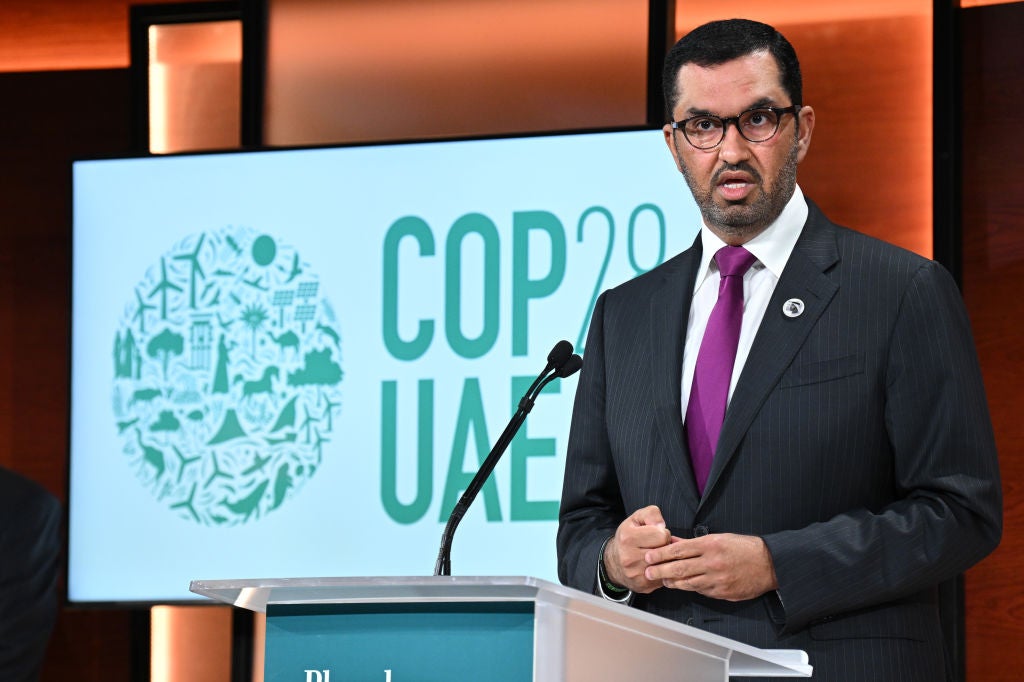
The United Arab Emirates (UAE) has plans to use its role as the host of annual UN climate summit COP28 to broker oil and gas deals with at least 15 nations, a joint investigation from the BBC and the Centre for Climate Reporting (CCR) has revealed.
Documents leaked by an anonymous whistleblower and obtained by independent journalists at CCR, a non-profit investigative journalism organisation, include more than 150 pages of briefings for meetings held between Sultan Ahmed Al Jaber, president of COP28 and CEO of state-owned oil company ADNOC, and foreign officials between July and October this year. The pages were prepared by the UAE’s COP28 team ahead of the summit, which is due to begin on Thursday.
Al Jaber has held dozens of meetings with senior government officials, business leaders and even royalty in the months leading up to the summit. His COP28 team has used “his access as an opportunity to increase exports of Adnoc’s oil and gas,” CRR said.
Analysis of the documents shows plans by the UAE to discuss fossil fuel deals with at least 15 nations including China, Brazil, Egypt and Germany. The country’s team did not deny that business talks were being planned at the summit, despite the UN body responsible for COP28 stating that hosts of the summit are expected to act without bias or self-interest.
Proposed “talking points” in the documents shows that ADNOC is willing to discuss “international LNG [liquified natural gas] opportunities” with China for projects in Mozambique, Canada and Australia.
The documents also suggest telling a Columbian minister that ADNOC “stands ready” to support Columbia with its development of its fossil fuel resources. The Brazilian environment minister was also to be asked for help “securing alignment and endorsement” for ADNOC’s $2.1bn (Dh7.71bn) bid to buy Braskem, Latin America’s biggest oil and gas company.
The briefings suggest telling Germany that ADNOC stands “ready to continue our LNG supplies”, and to tell Saudi Arabia and Venezuela, both major oil producers, that “there is no conflict between the sustainable development of any country’s natural resources and its commitment to climate change”.
Further talking points for other foreign governments are set out in the documents, all suggesting that Al Jaber tell them ADNOC is open to do deals to develop fossil fuel projects in their respective countries.
The documents also show that the UAE prepared talking points on business opportunities for its state-owned renewables company Masdar with at least 20 countries including the Brazil, China, Egypt, France, Germany, Kenya, the Netherlands, Saudi Arabia, the UK and the US.
UAE’s actions “breathtakingly hypocritical”
Michael Jacobs, professor of political economy at Sheffield University in the UK, condemned Al Jaber’s actions as “breathtakingly hypocritical”.
“The UAE at the moment is the custodian of a United Nations process aimed at reducing global emissions. And yet, in the very same meetings where it’s apparently trying to pursue that goal, it’s actually trying to do side deals which will increase global emissions,” he added.
Serious backlash followed both the selection of the UAE, a petrostate and one of the world’s biggest oil producers, as host country, and of Al Jaber, CEO of the most profitable oil company in the world, as leader.
Concerns over conflicts of interest between the country’s economic dependence on oil and the purpose of COP summits as a means for nations to discuss and commit to phasing out fossil fuels have been rife all year. Teresa Anderson, global lead on climate justice at development charity ActionAid said in January that Al Jaber’s “appointment goes beyond putting the fox in charge of the henhouse”.
Ann Harrison, climate advisor at Human rights NGO Amnesty International, said in rection to the BBC and CCR revelations: “Amnesty International has repeatedly warned it was not possible for Sultan Al Jaber to be an honest broker at a summit where the rapid and equitable phasing-out of fossil fuels to avert further trashing the climate and a just transition to renewable energy must be the priority.
“The appointment of the chief executive of one of the world’s largest fossil fuel companies to lead COP28 was always a brazen conflict of interests, which undermines the meeting’s ability to reach the outcome we desperately need,” she added.
Al Jaber’s attempts to discuss business appear to be a serious breach of COP standards set by the UN Framework Convention on Climate Change (UNFCCC), which is responsible for climate negotiations at the summit. These standards stipulate that the “cardinal principle” for COP presidents and their teams is “the obligation of impartiality”. Its code of ethics also states that officials at COP summits are to “avoid any conflict of interests as well as situations which might reasonably be perceived as giving rise to a conflict of interest”.
At a press conference last month, COP28 director-general Majid al-Suwaidi insisted that the UAE’s summit team was “fully independent” of both ADNOC and Masdar.
In a statement, the COP28 team told the BBC: “The fact that Dr Sultan al-Jaber holds a number of positions alongside his role as COP28 president-designate is public knowledge and something we have been transparent about from the outset.
“Dr Sultan al-Jaber is singularly focused on the business of COP and delivering ambitious and transformational climate outcomes at COP28,” the statement said, adding it would be a “distraction” to suggest that the work he has undertaken has not “been focused on meaningful climate action”.



